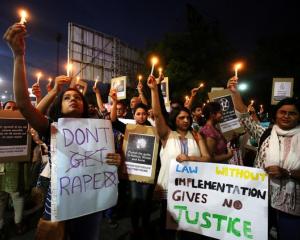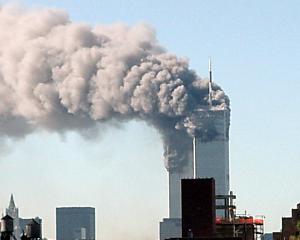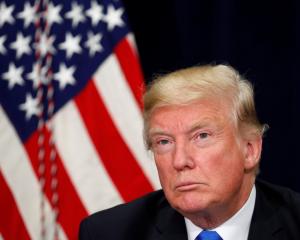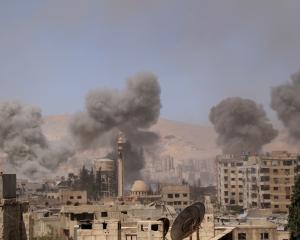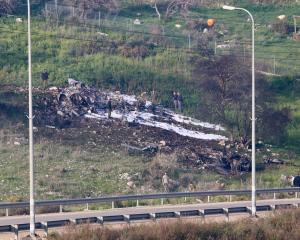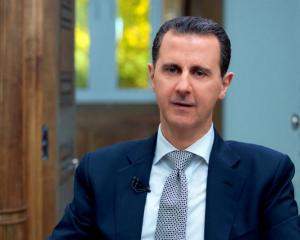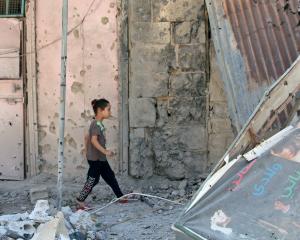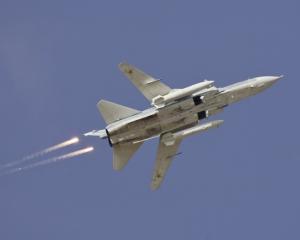A car bomb has blown up at a Syrian military post in the eastern city of Deir al-Zor, killing nine people, an attack that Syria said was the latest proof that an uprising against President Bashar al-Assad is a foreign plot.
The official SANA news agency said the blast had been the work of a suicide bomber, and had killed nine and wounded about 100, including guards, at what it called military installations. It said residences had been damaged.
State television broadcast footage of smoke rising over the city, pools of blood amid rubble, the damaged facades of buildings and twisted, smoking vehicles.
Opposition activists said the target was an intelligence base.
"It seems like a well-planned attack. The explosion hit the least guarded rear gate of the Military Intelligence complex ... where the operatives keep their cars," said one activist in Deir al-Zor.
State television called the blast part of a campaign funded by Saudi Arabia and Qatar to topple Assad.
The Sunni-led Gulf powers have called for military assistance for the Free Syrian Army, a loosely organised force of defecting soldiers and protesters formed in response to Assad's bloody crackdown on what began 14 months ago as a peaceful uprising.
Syrian television said U.N. staff who are supposed to be monitoring an internationally brokered ceasefire, which has yet to take hold, had inspected the site.
The U.N./Arab League peace plan drawn up by Kofi Annan aims to mark a political path out of the violence in Syria.
U.N. peacekeeping chief Herve Ladsous, in Damascus for consultations with ceasefire observers, told reporters on Saturday: "This is a process. We have reached certain elements of our objectives. We are not there yet..."
French President Francois Hollande said on Saturday leaders of the Group of Eight countries, meeting at Camp David, had agreed to continue supporting Annan's Syrian peace efforts.
"I insisted that all the participants support Kofi Anan's mission so that observers can provide protection of the Syrian people from their leaders," Hollande said referring to U.N. personnel operating in the country.
SUICIDE BOMBINGS
Twin suicide bombings on security facilities in Damascus killed at least 55 people this month, the deadliest in a series of such attacks in the capital.
On Thursday Syria sent a letter to the United Nations saying members of al Qaeda and the Muslim Brotherhood were using border areas of neighbouring Lebanon - where Syria has long influenced the security apparatus - to arm Syrian rebels.
It pointed the finger at a Sunni Muslim political movement led by Saad al-Hariri, son of assassinated former minister Rafik al-Hariri, and at Lebanese Sunni Muslim Salafist groups.
Last week Sunni Muslims in the Lebanese city of Tripoli fought street battles against Alawites, members of an offshoot of Shi'ite Islam to which most of Assad's Syrian ruling establishment belong, despite being in the minority in Syria.
Earlier this month, Syria sent the United Nations the names of 26 foreigners who it said were affiliated with the Sunni Muslim militant group al Qaeda who had been caught trying to enter from Turkey to fight.
On Saturday state television said security forces had thwarted two more such infiltration attempts, one in Idlib province, which borders Turkey, and one from Lebanon.
A British-based opposition group, the Syrian Observatory for Human Rights, said security forces had shot and killed a man in Khan Sheikhoun in Idlib, and that unidentified gunmen had killed two people in the northern city of Aleppo.
There was no independent verification of the claims from Syria, which allows little or no access to foreign journalists.
Members of Syria's main opposition grouping, the Syrian National Congress, have accused Assad of orchestrating the bomb attacks in order to discredit them and flesh out his account of a foreign conspiracy.
The head of the SNC, Burhan Ghalioun, told Reuters this week he was ready to step down after facing criticism that he has failed to strengthen ties between the exile-led organisation and anti-government protesters and fighters within Syria.
Critics also accuse him of failing to win international recognition as the voice of opposition to Assad and serving as a secular front for a body in which the most powerful elements belong to Syria's Sunni Islamist Muslim Brotherhood.



